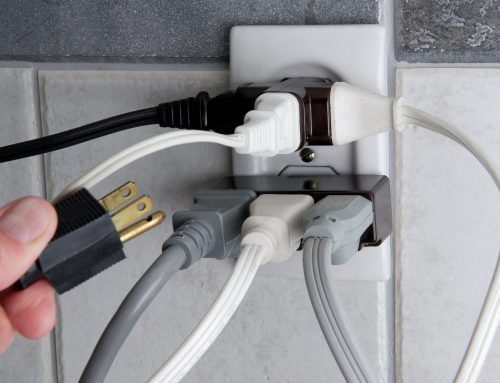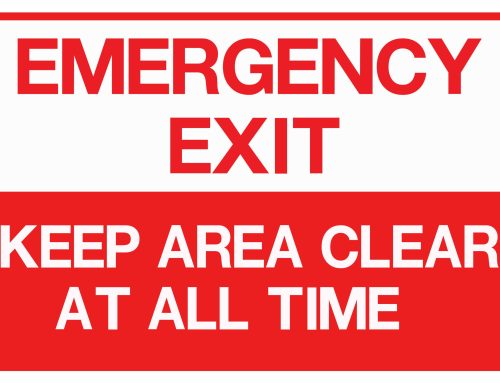There’s no pandemic playbook for fire code enforcement. Authorities Having Jurisdiction (AHJs), fire protection professionals, and fire departments are left to adapt as best they can. There’s no clear-cut answer on how fire code enforcement needs to adapt during a pandemic, or how to navigate the many hurdles to ensuring fire safety during this time of business closures and social distancing. The goal of everyone in the fire protection industry is still to safeguard the protection of buildings and their occupants. But how does that change, shift, and evolve during this time to secure safety now and post pandemic?
Fire code infractions
During the COVID-19 pandemic, there are inevitably going to be fire code infractions as businesses, and especially the healthcare industry, scramble to react to this crisis. Hospitals and healthcare facilities, for example, may be in violation of fire code if they are storing excess containers of Alcohol-based hand rub (ABHR) sanitizers. Improper storage of this highly flammable liquid is another concern. But what are hospitals to do? They are faced with limited space and a need for sanitizer and Personal Protective Equipment (PPE) like never before.
An article published by the NFPA entitled “How COVID-19 has Highlighted Various Compliance Issues in the Fire Code,” brings up these issues and many other fire code concerns. Other concerns cited in the article include:
- Compromised means of egress
- To control who enters/exits a building, exits may be blocked, locked, or obstructed
- Increase in residential fires
- More time at home means an increase fire risk; danger is compounded if smoke detectors aren’t working
- Access issues for routine inspections, testing, and maintenance of fire protection systems
- Business shutdowns and limitations on who can enter a building affect the accessibility of inspectors/techs
We’re all navigating this pandemic as we go, but fire safety and fire code enforcement cannot be compromised. In this article, the NFPA suggests that building owners/facilities managers should make efforts to maintain inspections and educate building occupants (especially residential buildings like apartment complexes) on the importance of smoke detectors and basic fire safety tips. Unfortunately, though, like everything else surrounding this pandemic, we are adapting as we go.
New construction, new building permits
Another issue for fire protection professionals and those in fire code enforcement is new construction being used to accommodate the ill or address the crisis in general. Some hospitals are using alternative locations for makeshift hospitals. Some cities are building new structures or repurposing existing structures in the area. When this happens, there’s a need for a new fire protection system to meet new fire code requirements. However; time and resources are strained.
NFPA’s Life and Safety Code (LSC) and regulations set by the Centers for Medicare and Medicaid Services (CMS) are both used to outline the specific requirements for healthcare facilities (this includes assisted living facilities) in Georgia. Adhering to these codes/requirements ensures the safety of healthcare facilities and used by inspectors and fire marshals.
These requirements vary by building type, occupancy, hazard, etc. When a new building is constructed, someone needs to design an entirely new fire protection system, and a fire protection professional needs to install this system. There are a lot of moving parts, and individuals involved. When new construction needs to be built fast, as is the current situation, fire protection professionals must be able to also act fast and efficiently. From fire extinguisher type to sprinkler systems; to fit a new or existing building with the fire protection measures necessary to meet the need.
Limitations for inspectors
A survey conducted by the International Code Council (ICC) on how jurisdictions throughout the U.S. are keeping up with inspections, new building permits, and new construction aims to provide a snapshot of code compliance during the pandemic. This survey was conducted from March 22nd, 2020 through April 1st, 2020. There were 1,500 respondents from 50 states. The findings solidified the concerns over hindrances for those working in the fire protection industry.
While safety measures like social distancing and business closures are enforced for our safety, these measures also create certain challenges for fire protection techs and inspectors.
The findings were as follows:
- 6 in 10 did not have the capability to remotely carry out critical aspects of their work
- 93 percent of the departments surveyed are still performing inspections; either remotely or in-person
- 65 percent reported that some or all employees that conduct plan review/inspections are working remotely
- 66 percent use a combination of electronic and hard copy versions of building safety codes; 7 percent use only electronic; 27 percent use only hard copies
The capacity for these fire protection companies to go virtual is a major hindrance. These hindrances include:
- 40 percent don’t have the capability to do electronic plan reviews
- 30 percent don’t have the capability to do any aspect of electronic/remote permitting
- 61 percent don’t have the capability for electronic/remote inspections
The bottom line is, that in order for inspections and code enforcement to proceed as needed during this pandemic, fire protection companies need time and resources to adapt. Inspections are critical to defend against fire, vandalism, and more. These aren’t services that can be put off for months.
Essential work
Life and safety professionals are deemed essential businesses, meaning that even in the event of a “shelter in place,” these individuals still work, and these companies are still open for business. The Building Safety Journal recently published an article explaining what this exactly means for those offering essential services.
The article explains: “On March 28, 2020, the United States Department of Homeland Security’s Cybersecurity and Infrastructure Security Agency (CISA) updated its Essential Critical Infrastructure Workforce advisory list. Building on guidance published March 19, 2020, the government has expanded its advisory list to include a list of essential services that include the fire protection industry.” The definition of those working in the fire protection industry include “workers providing electronic security, fire, monitoring and life safety services.”
We need those in the fire protection industry to be there for hospitals when they are overwhelmed with COVID-19 patients, to make sure other disasters don’t occur. We need inspectors, code enforcers, and fire departments to keep our nation running during this debilitating pandemic. There are, and will continue to be, challenges to keeping buildings safe and compliant through this unprecedented time, but it’s a necessary and lifesaving job that needs to continue.
Fire Systems, Inc.
Fire Systems, Inc. is a fire protection company based in Atlanta, Georgia. We have over 30 years of experience in the fire protection industry and are one of the only local fire protection businesses offering all services. From sprinkler to fire alarm, our goal is to be your one source for all things fire protection. Our knowledge of local and state-wide fire code enforcement makes us a vital resource for your company.
We are in your corner during these unsettling times. We are here for you, open for business, and ready to serve your company in whatever ways are necessary to keep your facility safe and compliant. Visit our website or call us today at 770-333-7979 for more information. We look forward to being your partner in fire protection.






